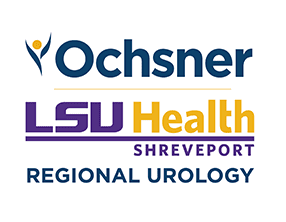Approximately 500,000 men choose vasectomy each year as a permanent form of contraception. Between 2-5% of these men will desire to have their fertility restored through vasectomy reversal. Fortunately, success rates of vasectomy reversal are very high (>90 %) when performed by a fellowship trained urologist using a surgical microscope.
Contact our Male Fertility Coordinator
Frequently Asked Questions
Why is Fellowship Training Important?
A fellowship is additional training in a very specific area that a physician chooses to pursue after completion of residency. For example, most male fertility specialists have completed a 5 to 6-year urology residency and then a 1 to 2-year andrology fellowship (male fertility fellowship). Fellowship trained male fertility specialists are very rare, making up approximately 1% of U.S. urologists.
During this fellowship, the urologist becomes proficient at microsurgery. This is important when discussing vasectomy reversal because success rates depend on the training and precision of the urologist. During a microsurgical vasectomy reversal, numerous tiny stitches finer than a human hair are used to create the reconstruction. This is very time consuming and tedious, but helps to create a very secure reconstruction with minimal trauma to the surrounding tissues.
There are several advantages of using an operating microscope to perform a vasectomy reversal. For instance, the microscope allows for significant magnification which permits the surgeon to use stitches that are difficult to see with the naked eye. Not only does it allow the surgeon to work with tiny stitches, but it also helps the surgeon make sure the stitches are placed correctly to avoid kinks and gaps in the reconstruction. Lastly, and probably most importantly, the microscope allows for the more complex reconstruction when needed.
(Dr. Jared Moss completed a 5-year urology residency at University of Tennessee-Knoxville followed by a 1-year Andrology (male fertility) fellowship at Northwestern Memorial Hospital in Chicago, IL).
Why is Fellowship Training Important?
A fellowship is additional training in a very specific area that a physician chooses to pursue after completion of residency. Fellowship trained male fertility specialists are very rare, making up approximately 1% of U.S. urologists.
During a male fertility fellowship, the urologist becomes proficient at microsurgery. Microsurgery refers to the use of a surgical microscope. This is important when discussing vasectomy reversal because success rates depend on training and precision. Bottomline: microsurgical vasectomy reversals done by a fellowship trained urologist result in higher success rates over time.
Dr. Jared Moss completed a 5-year urology residency at University of Tennessee-Knoxville followed by a 1-year Male Reproduction Medicine and Surgery Fellowship at Northwestern Memorial Hospital in Chicago, IL.
What Type of Reconstructions are Possible?
There are two types of reconstruction: Vasovasostomy (VV) and Vasoepididymostomy (VE). Unfortunately, it is not possible to know prior to the surgery which type of reconstruction will be required. The urologist performing the surgery should be capable of both.
To determine which reconstruction will be required, the physician will sample fluid from the end of the vas deferens at the time of surgery. If the fluid shows sperm, then the traditional VV reconstruction is performed.
During a VV, the surgeon bypasses the prior vasectomy site and connects healthy vas deferens above the prior vasectomy site with healthy vas deferens below the prior vasectomy site.
If the physician samples the fluid from the vas deferens and it is unfavorable (no sperm), then the patient will need the more complex VE reconstruction.
In this case, the healthy vas deferens is carefully connected to the epididymis (area on the side of testicle where sperm mature)
Men who are greater than 10 years out from vasectomy are at higher risk needing a VE.
This reconstruction is NOT possible without a microscope.
It is very important for patients to know in advance whether their physician is microsurgically trained and capable of performing the more complicated VE when needed. If a patient needs a VE and only receives a VV, the operation will not be successful.
Surgery- Pros & Cons
Pros for vasectomy reversal: typically restores natural fertility, high success rates in appropriately selected couples when performed microsurgically, allows for multiple children over time, lower risk for multiples (twins), typically less expensive than IVF, and natural pregnancy is possible.
Cons for this approach include: requires general anesthesia, couples may need to proceed with insemination (IUI) or IVF if reconstruction is unsuccessful, average time to pregnancy after reversal is approximately 1 year, and requires contraception or repeat vasectomy after finished having children.
Success Rates
Regarding vasectomy reversal success, couples must understand the difference between patency (sperm returning to the ejaculate) and pregnancy.
Patency rates for vasectomy reversals are greater than 90% when performed with an operating microscope and when the preferred VV reconstruction is possible on at least ONE side.
Pregnancy rates with this approach range from 40-70% dependent on multiple factors including female reproductive issues and age.
Sometimes the complicated reconstruction, the vasoepididymostomy (VE) is required. Patency rates for this approach (when a VE is needed on BOTH sides) are approximately 66% and pregnancy rates typically range from 30-50%, depending on female factors.
Unfortunately, there is no way to know prior to surgery which approach will be needed.
In Vitro Fertilization (IVF)
It is important that couples understand that vasectomy reversal is not the only option to father children after having a vasectomy. Other options include testicular sperm extraction (TESE) and in vitro fertilization (IVF).
IVF is a procedure that is performed by a Reproductive Endocrinologist.
Briefly, sperm are extracted from the man’s testicle(s) with a small outpatient procedure. The female is placed on injectable hormones for several weeks and then has a small outpatient procedure to extract her eggs. In the lab, the sperm are either injected into the egg or mixed with the egg. The embryos are then incubated in the lab and transferred back to the female’s uterus at a later date. Follow up testing is required to determine if there is a viable pregnancy.
Pros for this approach include: minor procedure to get sperm from testicle, may be a more direct route for couples where time is of the essence, high success rates in appropriately selected couples (dependent on female age), and may be a great option for couples that only desire one child.
Cons for this approach include: injectable hormones for the female, outpatient procedure to retrieve her eggs, higher risk for multiples (twins), typically more expensive, and potential ethical issues for some couples regarding leftover embryos.
Success rates for this procedure vary greatly depending on which reproductive endocrinologist you see. We are happy to arrange consultations with them as needed.
What About the Cost?
Regional Urology offers very competitive pricing. This procedure is not covered by insurance, and we offer package pricing (cost of general anesthesia, surgical supplies, and surgeon fee).
This is generally less than the cost of sperm extraction (TESE) and in vitro fertilization (IVF).
We encourage patients to inquire about pricing before or after their initial consultation to get the most up to date pricing package. 318-683-0411 Ext 178.
Do you offer a Money-Back Guarantee?
Yes! We are confident in Dr. Jared Moss’s training, success fates, and abilities. Our confidence is your benefit! We offer a Money-Back Guarantee on the surgeon fees. Click HERE to learn more!
What if I Am Not From North/Central Louisiana?
We are more than happy to work with patients outside the area! In this scenario, we would ask the patients to call the office and let us know if you are from out of town and you are interested in discussing vasectomy reversal. We try to limit your travel to Shreveport when possible.
The office will then set up a telemedicine with Dr. Moss to discuss the surgery. All you need is a smart phone to do this.
If you decide to proceed, we would ask you to be in Shreveport at least 24 hours prior to procedure. Dr. Moss will do an office visit the day prior to surgery to examine you, review the details surrounding the procedure, and make sure all paperwork is complete.
Surgery will typically start early the following morning and you are free to go home afterwards. Some patients prefer to stay another night to rest. The decision is up to the patient. Icing is required for the first 24-48 hours after surgery.
If you need a hotel in the area and we are happy to make recommendations. There are many upscale hotels located in downtown Shreveport / Bossier which are associated with the casinos and Louisiana Boardwalk. These accommodations are about a 15-minute drive to our office / surgery center.
For those looking for accommodations closer to our office / surgery center:
Hampton Inn is located very close to our office / surgery center. Less than 5 min drive.
What About Freezing Sperm?
Freezing sperm at the time of vasectomy reversal is also an option for couples. This is optional as success rates for sperm returning the ejaculate are very high for most men and freezing sperm adds additional cost (cost to freeze and cost to store sperm). Regardless, patients should be informed of this option. Please let us know if you have further questions or concerns about this. We are happy to help arrange. There is additional cost associated with this.
Post-Operative Details
- Please alternate ice packs to scrotal incisions for the next 24 hours.
- Ok to remove scrotal support the following day at noon and then shower. No tub baths as stitches in the skin are absorbable.
- No heavy lifting (greater than 10lbs) for the next 48 hrs. After that it is ok to ease back into activity. Common sense rules apply: if it hurts, don’t do it.
- No sex for 2 weeks. After that easy back into sexual activity. You do not have to wait for semen testing to be positive to resume sex.
- Please wear supportive briefs until follow up appointment.
- Swelling, mild bruising, and discomfort are very normal. Most men require not require narcotic pain tablets.
- We will resume semen testing approximately 6 weeks after surgery and then every 3 months for the first year.
Patient Resources
View the link below for more patient resources:


